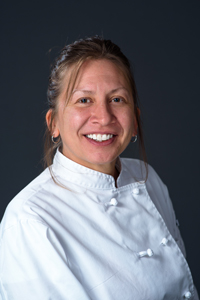Culinary Arts
Learning Outcomes
- Maintain sanitation levels required by Federal, State, and Local officials. Operate and clean commercial equipment properly.
- Access, compile, and evaluate food cost, labor cost, beverage cost, and operation cost from the point of making profit.
- Apply knowledge of culinary math, written and oral communication, restaurant business knowledge, kitchen supervision, and cooking ability.
Contact Information
Pathways
Technical Standards
The Culinary Arts program technical standards have been developed to inform students of the nonacademic essential functions of the program and profession. Examples are not all inclusive.
| Standard | Essential Function | Examples |
|---|---|---|
| Communication Oral / Written |
|
|
| Mobility / Motor Skills |
|
|
| Physical Strength and Stamina |
|
|
Sensory
|
|
|
| Environmental / Occupational Exposure |
|
|
| Field or Industry Professional Standards |
|
|
Associate to Bachelor Agreements
Technology Requirements
Students in the Culinary Arts program need:
- A PC computer or laptop (not Apple and preferably not a Chromebook)
- High-speed internet access
- Microsoft Office installed on the computer (software provided by WCC)

